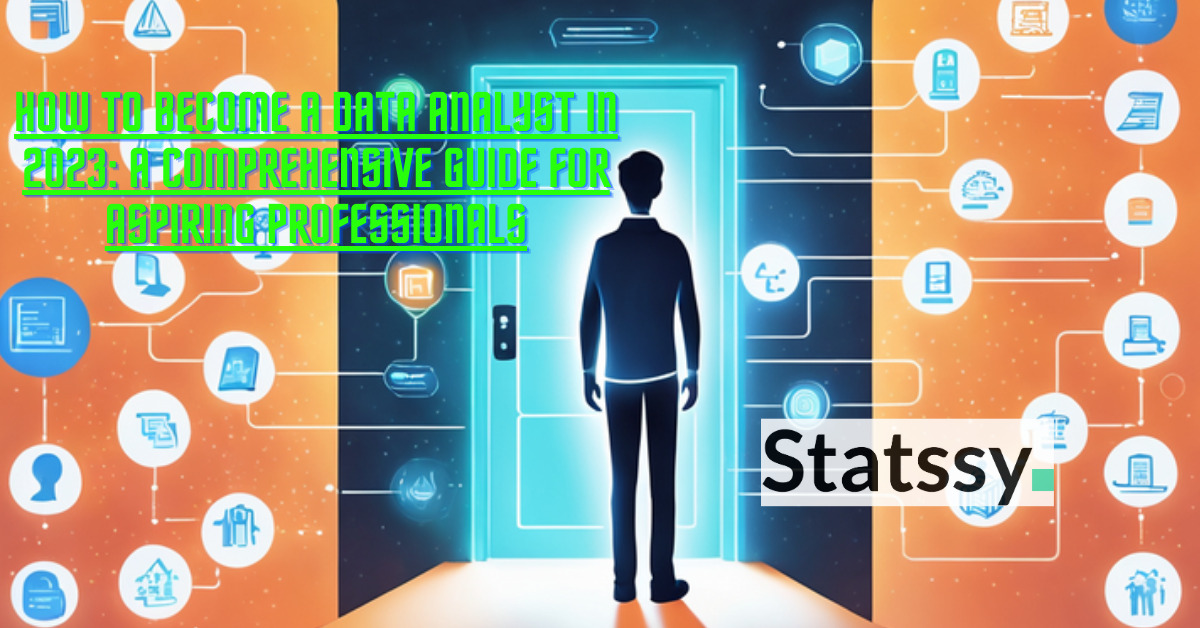Table of Contents
Hey There!! Welcome to Statssy! Today I will give you the idea about how you can become a data analyst.
The field of data analysis is continuously growing, creating substantial opportunities for those who are skilled in interpreting complex datasets. As a Data Analyst, you’ll play a crucial role in translating numbers into actionable insights that drive business decisions. But how to become a data analyst? Here, we will delve into this question and guide you through the process.
Starting From Scratch
You might wonder, “How to become a data analyst from scratch?” Well, it’s indeed possible to embark on this rewarding career path without prior experience. The key lies in gaining the necessary skills and knowledge that this field requires.
Let’s start with the educational requirements. A degree in fields like Mathematics, Statistics, Economics, or Computer Science can provide a solid foundation.
However, in this digital age where online education is gaining ground, don’t get disheartened if your degree doesn’t align with these fields. Many successful data analysts have transitioned from various backgrounds, including business, accounting, and even psychology.Data Analyst in 2024
The Role of Degree in Data Analyst 2024
“Do you need a degree to become a data analyst?” is a common question among aspiring data analysts. While a degree related to the field can be beneficial, it’s not a strict requirement. Many data analysts have paved their way to success through bootcamps, online courses, and certifications, reinforcing the fact that skills matter more than a traditional degree.
Therefore, if you’re thinking about how to become a data analyst with a business degree or how to become a data analyst with an accounting degree, rest assured that it’s entirely feasible. Even those with a psychology background can transition into data analysis, provided they acquire the necessary technical and analytical skills.
What Qualifications Do You Need to Be a Data Analyst?
Apart from degrees, specific qualifications are often preferred by employers. The key requirements for becoming a data analyst generally revolve around technical knowledge and analytical skills. Proficiency in languages like R, Python, and SQL is essential for handling, manipulating, and analyzing data.
Moreover, a data analyst should have a strong understanding of statistical analysis. Tools like SPSS and Excel are commonly used for this purpose. Learning how to get data analysis on Excel is one of the basic steps towards becoming a data analyst.
Finally, excellent communication skills are needed to present findings to non-technical stakeholders. So, the combination of these skills essentially answers the question of “What to do to become a data analyst?”
In the next part, we will delve deeper into how to navigate this career path after completing various levels of education, such as after 12th grade or after completing an MBA. So, stay tuned!
A Path for Every Aspirant
There are various pathways to becoming a data analyst, catering to individuals at different stages of their educational journey. Whether you are a high school graduate, a commerce student, or an MBA holder, the data analysis field has opportunities for you.
Data Analysis After 12th Grade
If you’re pondering how to become a data analyst after 12th grade, start by choosing a suitable undergraduate degree. A bachelor’s in fields like computer science, statistics, mathematics, or data science can equip you with the essential skills. Simultaneously, you can start learning programming languages like R and Python, which are extensively used in data analysis. Additionally, taking part in projects and internships can provide practical exposure to the world of data analysis.
Venturing into Data Analysis After B.Com or B.Sc.
For those considering how to become a data analyst after B.Com or B.Sc. in Maths, the journey is a mix of leveraging your existing skills and learning new ones. For instance, B.Com graduates can capitalize on their business acumen while diving deep into technical skills. On the other hand, B.Sc. Maths graduates already have a solid understanding of statistics, a vital aspect of data analysis.
Stepping into Data Analysis After an MBA
If you’re pondering how to become a data analyst after MBA, it’s worth noting that your advanced knowledge of business processes can be your unique selling proposition. Coupling this with technical know-how and statistical skills can make you a highly sought-after candidate in the data analysis domain.
Gaining Experience as a Data Analyst 2024
One of the key steps to becoming a data analyst is gaining hands-on experience. Real-world projects offer invaluable insights into data analysis processes, challenges, and solutions. Thus, if you’re wondering how to get a job as a data analyst, start by working on projects, either independently or as part of online courses and bootcamps.
In the final part of this guide, we will explore some niche domains within data analysis and provide tips on how you can become a data analyst in those fields.Data Analyst in 2024
Carving Your Niche as a Data Analyst
Data analysis is a broad field with opportunities in various sectors. Whether it’s football, healthcare, or business, data analysts are driving decision-making with their insights.
Data Analysis in Football
If you’re wondering how to be a data analyst in football, it starts with understanding the sport inside out. Data analysts in football leverage player statistics, team performance data, and other relevant metrics to provide strategic insights. A background in sports science or similar fields, along with expertise in data analysis tools, can prepare you for this role.
Data Analysis in Healthcare
For those considering how to become a data analyst in healthcare, a background in health sciences or biology can be beneficial. Healthcare data analysts use their skills to track patient outcomes, improve healthcare delivery, and facilitate medical research.
Data Analysis with a Business Degree
If you hold a business degree and are contemplating how to become a data analyst, your understanding of business operations, combined with data analysis skills, can be a strong foundation. The same applies to those with degrees in accounting or psychology, given that you’re willing to acquire the necessary technical prowess.
Final Thoughts
Remember, becoming a data analyst is a journey, not a destination. The field is ever-evolving, requiring continuous learning and skill development. Whether you’re starting from scratch or transitioning from a different industry, embrace the learning curve and enjoy the process.
After all, as a data analyst, your role is to make sense of chaos and uncover the hidden stories within datasets – a mission both challenging and rewarding.Data Analyst in 2024





